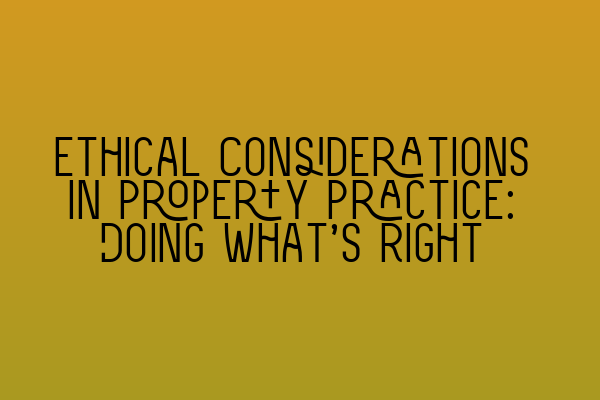Ethical Considerations in Property Practice: Doing What’s Right
As property practitioners, it is crucial for us to uphold the highest ethical standards in our day-to-day work. Our clients trust us to act in their best interest, and it is our responsibility to ensure that we not only meet their legal requirements but also conduct our business with integrity and honesty. In this blog post, we will explore some of the key ethical considerations in property practice and discuss the importance of doing what’s right.
1. Confidentiality and Privacy
One of the fundamental principles of the legal profession is client confidentiality. We have a duty to protect our clients’ information and maintain their privacy throughout the entire property transaction process. This means that we should handle their personal and financial details with the utmost care and avoid disclosing any confidential information without their consent.
2. Conflict of Interest
Another crucial ethical consideration is avoiding conflicts of interest. As property practitioners, we may come across situations where our personal or professional interests conflict with our duty to act in our clients’ best interest. In such cases, it is imperative to disclose any potential conflicts of interest to our clients and take appropriate steps to mitigate them. This could involve seeking independent legal advice or even withdrawing from the representation if necessary.
3. Honesty and Transparency
Honesty and transparency are key pillars of ethical property practice. We must provide our clients with accurate and truthful information, ensuring that they have a complete understanding of the legal complexities and potential risks involved in their property transactions. If we become aware of any material information that could impact our clients’ decisions, we have a duty to disclose it to them promptly.
4. Fair and Reasonable Fees
Charging fair and reasonable fees is an ethical obligation that we must uphold in property practice. Our clients trust us to provide them with quality legal services at a fair price. It is important to be transparent about our fee structure, discuss it with our clients in advance, and ensure that our charges align with the services provided. Any additional costs or disbursements should be clearly explained and agreed upon.
5. Professional Competence and Development
As property practitioners, it is essential to maintain our professional competence and keep up with the evolving legal landscape. This means continuously updating our knowledge and skills through ongoing professional development and training. Staying informed about changes in property law and best practices enables us to provide the highest level of service to our clients.
6. Social Responsibility
Property practice is not only about serving individual clients but also contributing to the well-being of the wider community. We have a responsibility to act in a socially responsible manner, considering the impact of our work on the environment and society as a whole. This could involve promoting sustainable property practices, supporting community initiatives, and being mindful of the potential social implications of our advice.
By adhering to these ethical considerations, property practitioners can build trust with their clients, establish a strong professional reputation, and contribute to the overall integrity of the legal profession. Doing what’s right may sometimes involve difficult decisions, but it is the cornerstone of a successful and ethical property practice.
If you’re interested in preparing for the SQE exams and enhancing your knowledge in property law, I recommend checking out these related articles:
– [SQE 1 Practice Exam Questions](https://fqps.co.uk/sqe/sqe1-preparation/mcq-practice-quiz): An invaluable resource to test your understanding of property law concepts and prepare for the SQE 1 exam.
– [SQE 1 Practice Mocks FLK1 FLK2](https://fqps.co.uk/sqe/sqe1-preparation/practice-mocks-quiz): Practice mock exams specifically tailored for the SQE 1 exam, covering various topics, including property law.
– [SQE 2 Preparation Courses](https://fqps.co.uk/sqe/sqe2-preparation): Explore comprehensive preparation courses designed to help you excel in the SQE 2 exam, including specific modules on property law.
– [SQE 1 Preparation Courses](https://fqps.co.uk/sqe/sqe1-preparation): Discover specialized courses that will equip you with the knowledge and skills needed to succeed in the SQE 1 exam, including property law modules.
– [SRA SQE Exam Dates](https://fqps.co.uk/sqe/sqe1-sqe2-exam-dates): Stay up-to-date with the latest exam dates for the SRA SQE exams, including SQE 1 and SQE 2.
Remember, ethical practice is not just a requirement; it is our duty as property practitioners. By prioritizing ethical considerations in our work, we can build strong client relationships, foster trust in the legal profession, and make a positive impact on the communities we serve. So let’s commit to doing what’s right, both legally and ethically, in every property transaction we undertake.
